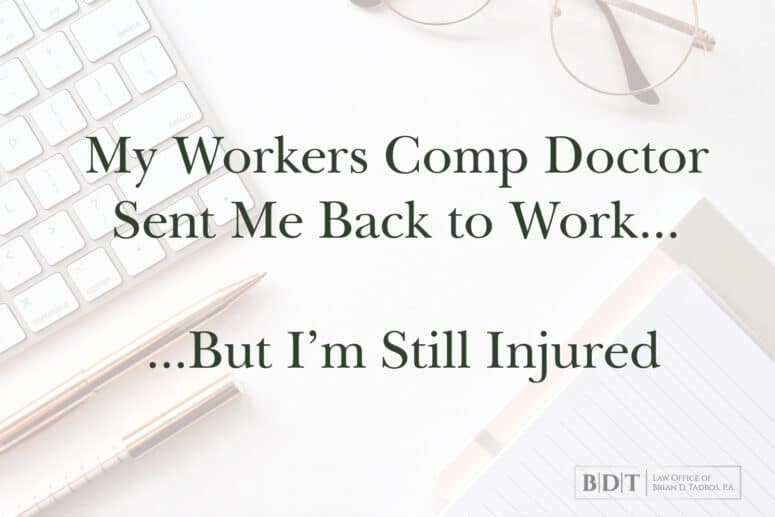


There are few things more anxiety-inducing than a work-related accident…but one of them is being sent back to work after your injury.
Your workers compensation doctor has a responsibility to oversee your medical care and make decisions in your best interest. For better or worse, your authorized treating physician has the final say on whether you can return to work or not. But what can you do if their professional opinion seems to be contrary to how you’re actually feeling?
We’ve spoken before about the dangers of returning to work too quickly (against doctor’s orders). Today, we’re going to discuss what your options are if you feel that your workers comp doctor is sending you back to work too quickly.
The first question is whether your workers comp doctor sent you back to work full duty or with work restrictions.
If your authorized physician feels that you are capable of doing some work (going on desk duty, for instance, rather than working on the factory floor), s/he may put you on “light duty.”

To communicate your limitations to your employer, your doctor will fill out a form listing all of the physical restrictions you must adhere to in order to avoid interfering with your recovery.
If you return to work with a restrictions letter, your employer is obligated to make these accommodations, if possible. If they cannot accommodate the modified work listed in your doctor’s orders, you will stay home and collect compensation benefits.
There are some instances, however, where your authorized treating physician will clear you for full-duty work when you don’t feel physically capable of performing it. What can you do then?
You have rights throughout your workers’ comp case . And one of those rights is the right to decide whether or not you follow the doctor’s instructions or stay at home.
Please note, however, that “freedom to choose” does not mean “freedom from consequences.”
Under Florida Statute 440.15(6) , refusing to return to suitable work being provided by your employer will result in you losing out on your compensation benefits. (This will not be reversed unless a Judge of Compensation Claims finds you were justified in your refusal.)

A good compromise is to go back to work and pay close attention to how your body is responding. If you feel that even your light-duty work is making your injury worse, you should get a re-evaluation. Your workers comp doctor may even change your work status.
I highly recommend that you keep a copy of your most recent work restrictions physically on you while at work. That way you can produce them if you are ever asked to do something that violates the restrictions.
Under Florida law, it is your employer’s workers comp insurance company—not you—who picks your authorized treating physician after a work-related injury.
However, the law also allows you to request a one-time change of your authorized treating physician to get a second opinion . Again, this second doctor will be selected by the insurance company, but if they don’t respond to your request within five days, you are permitted to see a doctor of your choosing.
It is worth noting that you are still obligated to keep performing your work duties while waiting for your physician appointment if you want to keep your benefits.
If you have already used your one-time change of physician or if you would rather pick a doctor for evaluation only , you have the option to see an Independent Medical Examiner, or IME.
Your IME doctor doesn’t provide treatment; rather, their job is to act as your expert and provide a medical opinion as to what conditions you have, whether they are related to your industrial accident, what treatment you need, whether you have reached maximum medical improvement, and what your work status should be. This medical evidence can then be used to litigate entitlement to benefits or treatment that the workers compensation insurance company may be denying.

Both you and the insurance company have the right to request an IME. If you are the one making the request, you will have to pay for it out of pocket (although you may be able to recover that cost if your case is successfully litigated). If the insurance company is requesting it, they’ll be the ones to foot the bill.
In many cases, your workers’ compensation case will end in a lump sum settlement from the insurance company. Returning to work during your case does not prevent you from being able to accomplish this.
However, remember that if you ultimately decide to pursue a lump sum settlement, you will likely have to sign a General Release and Resignation as part and parcel of the settlement. This means you will not only relinquish any claims to further compensation, but will result in your resignation as well.
Another option (that you always have, by the way!) is to get a workers compensation lawyer that can provide you with guidance, advice, and legal assistance.
Even if your employer assures you that they are on your side, you should understand that your fight is not only with them, it’s also with their insurance company. And we can guarantee you that the insurance company has a team of lawyers and other legal professionals working on their behalf.
You deserve a legal expert on your side—specifically a work injury lawyer who specializes in cases like yours.
At the Law Office of Brian D. Tadros, P.A., we practice workers’ compensation law and only workers’ compensation law. When you visit our office, you don’t meet a paralegal or receptionist, you meet with Brian Tadros himself for a free, one-on-one consultation about your unique claim.